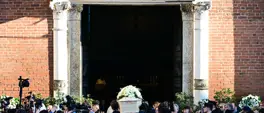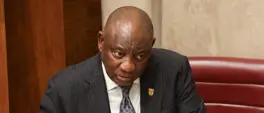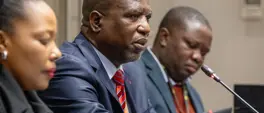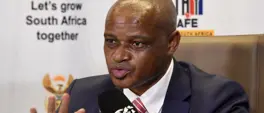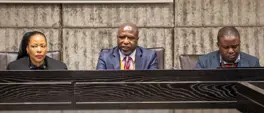MALAIKA MAHLATSI | We must not do to Loyiso Lugayeni-Masuku what was done to Dr Nkosazana Dlamini-Zuma
Malaika Mahlatsi
2 May 2025 | 11:47The real debate pertaining to Lugayeni-Masuku’s candidacy should be about her track record and aptitude. The question that must be asked is whether she is the right person for the job of leading the ANC in Johannesburg, which may result in her being the Executive Mayor of the wealthiest city in Africa.
The 54th National Conference of the African National Congress (ANC) that took place from the 16th to 20th December at the Johannesburg Expo Centre in Nasrec will be remembered in history as a moment when the ANC came dangerously close to rewriting and defining history. It was at that conference where the oldest and biggest former national liberation movement in South Africa almost had a woman president for the first time in its then 105-year history, which would have cleared the path for her becoming the first-ever democratically-elected woman president in our country.
Dr Nkosazana Dlamini-Zuma came closer than any other woman had in history, but went on to lose to Cyril Ramaphosa, the sitting president of the republic and the ANC. Ramaphosa won by just 179 votes, a small margin by any measure.
Numerous factors led to Dlamini-Zuma’s defeat, one of which was the narrative that was cemented around her potential presidency both within and outside the ANC. This narrative sought to present Dlamini-Zuma as an extension of her former husband, president Jacob Zuma, whose scandalous presidency would end in humiliation and resignation just two months after the Nasrec conference. The media played an instrumental role in shaping this narrative. So callous was the media that the South African Broadcasting Corporation (SABC) had to launch an investigation and issue a public apology for referring to Dlamini-Zuma as “Zuma’s ex-wife” and “mini-Zuma” in news bulletins. As if this was not bad enough, the Broadcasting, Electronic Media and Allied Workers' Union (Bemawu) went on to legitimise this callousness, arguing that the bulletin editor who was responsible for these references committed “no wrongdoing”.
Here was Dlamini-Zuma, a woman who has no doubt earned her stripes, reduced to her ex-husband. The woman was one of the most decorated politicians in our country who served as a minister in every cabinet since the dawn of democracy. She served in the ministries of Health, Foreign Affairs, Home Affairs, as a Minister in the Presidency for the National Planning Commission for Policy and Evaluation and at the time of the Nascrec conference, was the Minister of Co-operative Governance and Traditional Affairs. In 2012, she was elected chairperson of the African Union Commission – the first time a woman had ever held the position in the organisation and its predecessor, the Organisation of African Unity (OAU). That she was an astute civil servant is not debatable.
In all the positions that she has held, Dlamini-Zuma made a lasting impact. As Health minister, she introduced the Tobacco Products Amendment Bill, which made it illegal to smoke in public buildings. As Foreign Affairs minister, South Africa was instrumental in mediating some of the worst conflict on the continent.
As Home Affairs, she turned around a department that was grossly mismanaged, which received its first clean audit in 16 years under her leadership. Later, she would play an instrumental in Ramaphosa’s cabinet, particularly at the height of the COVID-19 pandemic. Notwithstanding some valid criticisms levelled against her, the most significant of which was her support for Virodene – a toxic industrial solvent rejected by the scientific community as ineffective – at the height of the HIV/AIDS pandemic, she did well in and outside government.
Despite the media’s attempts to paint Dlamini-Zuma as someone who would be Zuma’s puppet, she has, throughout her political career, maintained her independence. In fact, at the bitter 52nd National Conference of the ANC where Zuma defeated then president, Thabo Mbeki, Dlamini-Zuma had supported the latter and was on his slate (she would go on to lose the deputy president position to Kgalema Motlanthe).
Nothing about her history or politics indicated that she was Zuma’s puppet. And yet, when she raised her hand to lead the ANC, all this was erased and the only thing that mattered was that she had been married to Jacob Zuma – a marriage that had ended in 1998, nearly 20 years before the Nasrec conference.
Today, a similar situation is playing itself out with the deputy regional secretary of the ANC in Johannesburg, Loyiso Lugayeni-Masuku, who is campaigning to become the chairperson of the ANC in the said region. Lugayeni-Masuku is married to Dr Bandile Masuku, the former Gauteng MEC of Health who was embroiled in a tender scandal during the COVID-19 pandemic.
Masuku was found by the Special Investigating Unit (SIU) to have failed to execute his functions in compliance with the Public Finance Management Act (PFMA) due to irregularities in his department’s procurement processes in the awarding of personal protective equipment (PPE) tenders amounting to R125 million to the late Prince Thandisizwe Madzikane Diko, who was married to the former presidential spokesperson, Khusela Diko, a close friend of Lugayeni-Masuku.
Solely on account of this friendship, a narrative has been created that Lugayeni-Masuku, who has never worked for the Gauteng health department and was working at a different tier of government, was somehow complicit. Not a single forensic or any other investigation implicated her. The narrative of her guilt and complicity, which is now being raised as she campaigns for the chairpersonship of the ANC in Johannesburg, is that she is the wife of Masuku.
Lugayeni-Masuku, who is currently the member of the mayoral committee (MMC) for Group Corporate and Shared Services in the City of Johannesburg, has a long history of service in the ANC. This history can be traced to her student days at the former Technikon Witwatersrand (now the University of Johannesburg) where she served in the Student Representative Council (SRC) as a deployee of the South African Student Congress (SASCO).
She went on to lead the ANC Youth League as the Regional Secretary of Johannesburg. She has also led in structures of both the ANC and the ANC Women’s League. In government, she worked in the private office of the then Executive Mayor of the City of Ekurhuleni, Mondli Gungubele, before transitioning to the provincial government where she initially served as a senior official in the Office of the Premier under Nomvula Mokonyane, then as a PR councilor and committee member for community development and municipal public accounts, before being appointed into the mayoral committee.
The real debate pertaining to Lugayeni-Masuku’s candidacy should be about her track record and aptitude. The question that must be asked is whether she is the right person for the job of leading the ANC in Johannesburg, which may result in her being the Executive Mayor of the wealthiest city in Africa.
That question must be answered by objectively assessing her track record both in the organisation and in government. Members of the ANC, and indeed, we the residents of Johannesburg, must ask Lugayeni-Masuku to account to us and explain why she is the right person to lead the much-needed rebirth and transformation of this city that we call home. We must demand, in no uncertain terms, evidence of her capacity and clarity of her vision for the city’s revival. This alone must be the measure.
We must insist on not repeating the injustice to which Dlamini-Zuma was subjected. It was wrong in 2017 when a woman who had earned her stripes was reduced to a “mini-Zuma” and “Zuma’s ex-wife” without any regard for her own history and capacity. It unfairly tarnished her presidential campaign and cemented a baseless narrative about her politics. It is wrong, in 2025, to reduce Lugayeni-Masuku to someone’s wife or friend, without any regard for her own history and politics. This unfair measure has historically only ever been applied to women. Men in politics never have to account for their wives, nor are their political fortunes determined by who they are or were married to.
Our current ambassador to China, Dr Siyabonga Cwele, was married to a woman who has since been convicted of drug trafficking. Here is a man who was the Minister of Intelligence between 2009 and 2014 when his wife (whom he divorced following her conviction) was trafficking drugs with a Nigerian syndicate. His political career was not affected by his wife’s actions.
He remained in cabinet and went on to be re-appointed after her conviction. He now serves as our ambassador to the second biggest economy in the world. Men in politics are not affected by the actions of their spouses. Why do we allow a double-standard when it comes to women? Why do we insist on reducing women to wives and ex-wives of politicians, as though they do not have their own agency? In what world is this just?
Malaika is a bestselling author, geographer and researcher at the Institute for Pan African Thought and Conversation. She is a PhD in Geography candidate at the University of Bayreuth in Germany.
Get the whole picture 💡
Take a look at the topic timeline for all related articles.


